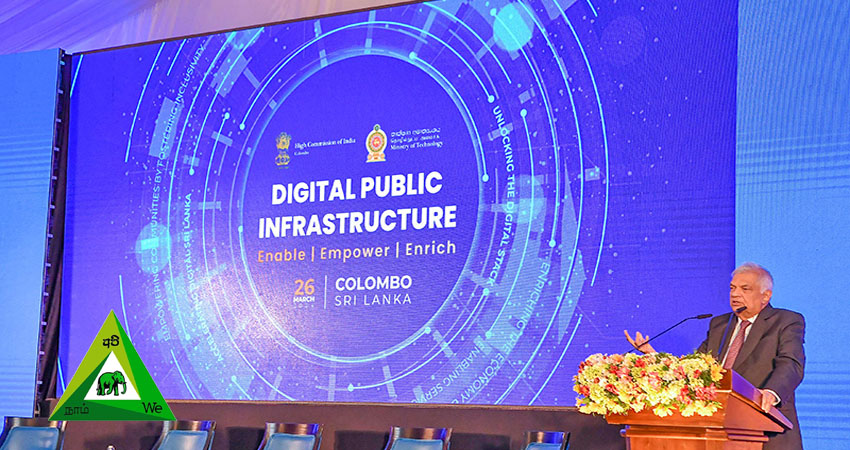President Wickremesinghe pledges Digital Transformation for Poverty Reduction and Educational Reform

- Announces Ambitious Education Reform and Collaboration with India for Technological Advancements.
President Ranil Wickremesinghe highlighted Sri Lanka’s commitment to agricultural modernization and emphasized the nation’s goal of reducing multi-dimensional poverty. By 2035, Sri Lanka aims to ensure that multi-dimensional poverty does not exceed 10%. While achieving zero poverty is unprecedented, the President acknowledged that even leading countries typically operate with a poverty rate around 7%.
To achieve this ambitious target, President Wickremesinghe stressed the importance of establishing a robust framework and gathering accurate data. This data will help identify individuals and areas most in need of assistance, considering various dimensions such as education, health, and income levels at the grassroots level. President Wickremesinghe emphasized that addressing multi-dimensional poverty is a crucial tool alongside efforts to enhance the education system.
President Wickremesinghe made these remarks while delivering the keynote speech at the Digital Public Infrastructure (DPI) Seminar today (26), at Taj Samudra Hotel, Colombo emphasizing the timeliness of the Seminar amid Sri Lanka’s shift beyond economic stabilization. Highlighting the achievement of stabilizing the economy and on-going negotiations with international creditors, President Wickremesinghe outlined the government’s economic transformation agenda.
This seminar on Digital Public Infrastructure co-organized by the High Commission of India in Colombo and the Ministry of Technology, Government of Sri Lanka, to explore the transformative potential of DPI for enabling service delivery, empowering communities by fostering inclusivity and enriching the economy by driving innovation.
President Wickremesinghe also expressed his intention to present the legislation to parliament by the middle of this year, at the latest, to enable the functioning of the proposed agency. He emphasized that this legislative and policy framework is crucial for Sri Lanka to become a competitive economy, especially as the Indian Ocean region emerges as a key growth area.
The President characterized Sri Lanka’s economy as a “patchwork economy,” describing it as a collection of disparate elements stitched together. He emphasized the need to transition towards a more cohesive digital economy.
Acknowledging the importance of digitalization, President Wickremesinghe highlighted the significance of discussions on the digital public economy. He outlined plans to establish a new institutional framework to facilitate this transition, moving away from existing structures like IT councils and focusing on creating a Digital Transformation Agency and an AI centre, allocated with a budget of LKR 01 billion. This agency would be dedicated to building a robust digital economy, departing from previous approaches that failed to yield desired outcomes.
He underscored the importance of digital infrastructure in modernizing agriculture, addressing multi-dimensional poverty, and reforming the education system.
The President stressed the importance of reinforcing the education system, both at the school and higher education levels, to support this initiative. One of the key decisions is to introduce Artificial Iintelligence (AI) into schools within the next five years, with the goal of integrating it into every school within five to eight years, extending to universities as well.
President Wickremesinghe expressed gratitude to the Indian government for their support, in advancing Sri Lanka’s digital economy, highlighting plans to collaborate with Indian institutions and leverage their expertise, particularly in establishing a campus of the Chennai Indian Institute of Technology (IIT) and additionally planning to launch three universities, two of which will focus on technology.
He highlighted the significance of India’s technological advancements and proposed leveraging their expertise to expedite Sri Lanka’s development by adopting suitable strategies. President Wickremesinghe underscored the need for collective support to implement these plans and emphasized the urgency of embracing modernization to propel Sri Lanka into the 21st century.
The President concluded by expressing optimism that the discussions at the workshop would contribute significantly to the nation’s development plans and programs.
Meanwhile speaking at the event State Minister of Technology Kanaka Herath outlined Sri Lanka’s commitment to operationalizing the DIGIECON 2030 roadmap, focusing on upgrading networks and promoting Digital Financial Services (DFS) for financial inclusion.
He further said the government aims to implement DPI across all levels to foster a connected digital government and address challenges like cyber-security.
Moreover, the State Minister announced plans for a global investment summit on June 25th, offering a platform for tech VCs. He urged investors to embrace change and contribute to the country’s digital evolution to explore investment opportunities in Sri Lanka’s burgeoning tech ecosystem.
Present at the event were Minister of Foreign Affairs Ali Sabry, Minister of Ports, Shipping, and Aviation Nimal Siripala De Silva, State Minister of Technology Kanaka Herath, Indian High Commissioner H.E. Santosh Jha, Parliamentarians Harsha De Silva, Kavinga Jayawardena, Mayantha Dissanayake, Charitha Herath, and Mohomad Muzammil. Also in attendance were Secretary to the Ministry of Technology Dr. Dharmasiri Kumaratunge and notable stakeholders from India and Sri Lanka.








